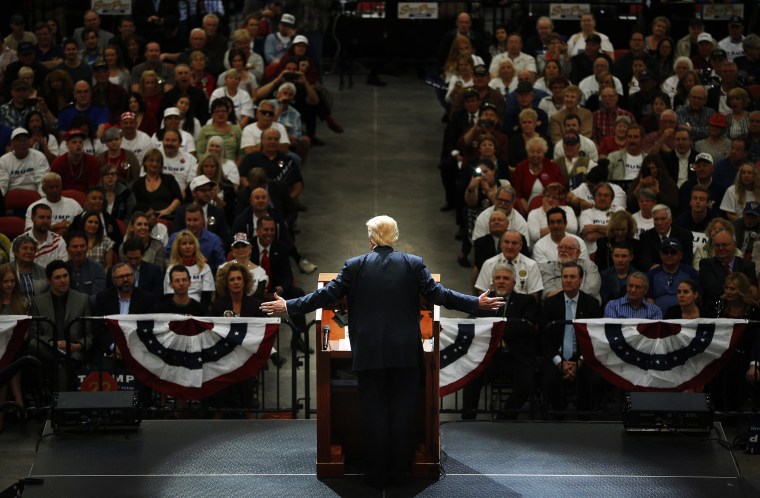Donald Trump says he has the solution to withering race relations in America – a good dose of “spirit” and jobs.
During an interview with the editorial board of The Washington Post this week, Trump talked broadly about foreign policy and tackling the expanding terror threat to America and its allies.
He talked about curbing the trillions of dollars in foreign aid that the government hands out across the globe, and redirecting much of it back to America, where it could be used to rebuild crumbling infrastructure, decaying schools and blighted urban communities.
But he also addressed, albeit rather one-dimensionally, his approach to bridging the widening chasm between the races and what a President Donald Trump could do to head off the sort of racially charged uprisings that have torn through places like Ferguson, Missouri, and Baltimore over the past year and a half.
RELATED: In reaction to Brussels terror attack, Trump says 'more' torture
“There’s a racial division that’s incredible actually in the country. I think it’s as bad, I mean you have to say it’s as bad or almost as bad as it’s ever been. And there’s a lack of spirit. And one thing I thought that would happen, and it hasn’t happened, unfortunately, I thought that President Obama would be a great cheerleader for the country. And it just hasn’t happened,” Trump said. “When you look at the Ferguson problems and the Baltimore problems and the Detroit problems. And you know there’s a lack of spirit. I actually think I’d be a great cheerleader – beyond other things, the other things that I’d do – I actually think I’d be a great cheerleader for the country. Because a lot of people feel it’s a hopeless situation. A lot of people in the inner cities they feel that way. And you have to start by giving them hope and giving them spirit and that has not taken place. Just has not taken place.”
Trump proposed economic zones and incentives for companies to move into the inner city and opined time and again on the lack of spirit in depleted black communities in particular. Trump’s non-interventionist foreign policy, according to the candidate, would position us to “rebuild our country.”
In Trump’s proposition of morale boosting and cheerleading and incentives for economic inclusion of poor and minority communities, there seems to be a contradictory spirit in terms of tone and rhetoric from what we’ve witnessed as Trump has campaigned across the country.
Trump rallies have increasingly turned into violent, virulent affairs, drawing the worst out of his supporters and protesters alike. Protesters who have attended his rallies have been punched, kicked and jeered, sometimes with racial epithets hurled at them by Trump’s supporters.
Like a maestro, Trump has time and again whipped his audiences into a frenzy with talk of building a wall along the Mexican border and insults for those who oppose him. Trump’s incendiary, often coded racial language from center stage has done little to boost the spirits of those who’ve taken umbrage to Trump’s anti-everyone-else brand of politics.
When asked by The Washington Post about racial disparities in the criminal justice system and the sour relationship between the police and people of color being at the root of recent unrest, Trump deferred mostly to his support of law enforcement rather than dig in with a concrete answer.
“I’ve read where there are and I’ve read where there aren’t. I mean, I’ve read both. And, you know, I have no opinion on that,” Trump said. Yet, despite feigning ignorance to the well-reported disparities black people face in the criminal justice system, Trump finally allowed that if true “it would concern me.”
At one point in the interview he referenced a Rite Aid store that was razed during the riots that unfurled in Baltimore in the wake of the killing of Freddie Gray while in police custody. “It took them 20 years to get it built, one store, and it burned down in one night—we have to create incentives for people to love what they are doing, and to make money. And to create, you know, to really create a better life for themselves.”
Trump's hammering at the economic conditions that anchor life in many of our most beleaguered communities did offer a bit of cold hard perspective. Particularly in his juxtaposition of the economic investment and opportunity offered overseas compared to what America offers to those on the other side of the tracks.
“It doesn’t seem right that you will have a situation like Baltimore, and many other places, let’s use Baltimore as an example, there are many Baltimores in this country… But that you’ll have a situation like that, and then we’re over nation-building with other, with countries that in many cases don’t want us there. They want our money, but they don’t want us,” Trump said.
“Jobs are so important,” he said, elaborating on his jobs-as-a-counterbalance-to-unrest point. “There are no jobs. There are none. You go to those communities and you can’t – there is nothing there. There is no incentive for people. It is a very sad situation. And what makes it even sadder is that we are spending so much money in other countries and our own country has vast pockets of poverty and a lot of this is caused by the fact that there are no jobs.”
